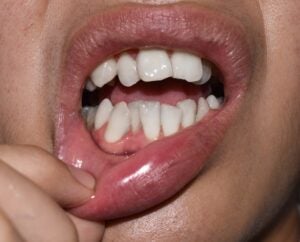-
Should I Get Veneers?
Should I Get Veneers in NYC?
Are you considering a smile makeover? Dental veneers might be the perfect way to transform your grin. These thin, custom-made shells bond to the front of your teeth, concealing imperfections and enhancing your appearance. But are veneers the right option for you? Let’s find out.
 Continue reading “Should I Get Veneers?”
Continue reading “Should I Get Veneers?” -
8 Tips for Healthy Teeth in 2025

A healthy smile never goes out of fashion. If you’re looking to take better care of your teeth in 2025, follow these eight tips to promote great oral health this year. Continue reading “8 Tips for Healthy Teeth in 2025”
-
Can Probiotics Help with Bad Breath?
 The Problem of Bad Breath
The Problem of Bad BreathBad breath is something that affects everyone from time to time, but for many people, it can become a chronic problem. In fact, bad breath, also called halitosis, ranks just behind cavities and periodontal disease in the list of reasons why people see the dentist. Going to the dentist is a good move, because, while bad breath can be the result of eating food like garlic, it can also be an indicator of oral issues like gum disease, cavities, and dry mouth. Your dentist can help rule these causes out, and may refer you to your primary care physician if there are concerns about health conditions that can cause bad breath, like diabetes or kidney disease. For most people, though, halitosis is caused by a blend of gases produced by mouth bacteria. Understanding that, scientists have begun to focus on using probiotics to help solve the problem of bad breath. Continue reading “Can Probiotics Help with Bad Breath?”
-
Detecting Dental Issues Early: The Importance of Regular Checkups
 The Importance of Early Intervention
The Importance of Early InterventionDoes the recommendation of twice yearly checkups seem like overkill to you? It’s not. Regular dental visits give the dentist a chance to become familiar with your mouth, and notice any changes in your oral health. That way, small problems can be addressed before they become major issues. From tooth decay to gum disease, dental issues that are detected early can be managed before they become difficult and expensive to treat. Continue reading “Detecting Dental Issues Early: The Importance of Regular Checkups”
-
The Impact of Stress on Oral Health
 Stress and Your Oral Health
Stress and Your Oral HealthYou probably know that stress can negatively impact your health, with chronic stress manifesting in a wide variety of health conditions. From disturbing your sleep to increasing your risk of heart attack or stroke, the results of poorly managed stress are a problem for your whole body. Did you know that stress also has a negative impact on your oral health? Continue reading “The Impact of Stress on Oral Health”
-
Choosing the Right Toothbrush and Toothpaste
 When it comes to the tools you are choosing to use for your oral hygiene, you want to make sure you select the absolute best. After all, your toothbrush and toothpaste are all you’ve got for cleaning your teeth, mouth, and gums. With so many options available, how do you find the best possible cleaning tools to enhance and clean your beautiful smile? The experts at Park 56 Dental can help you understand what to look for when choosing these important tools. Let’s break it down and examine the criteria you’re looking for.
When it comes to the tools you are choosing to use for your oral hygiene, you want to make sure you select the absolute best. After all, your toothbrush and toothpaste are all you’ve got for cleaning your teeth, mouth, and gums. With so many options available, how do you find the best possible cleaning tools to enhance and clean your beautiful smile? The experts at Park 56 Dental can help you understand what to look for when choosing these important tools. Let’s break it down and examine the criteria you’re looking for.Continue reading “Choosing the Right Toothbrush and Toothpaste”
-
How to Handle Dental Issues When You’re Traveling for the Holidays
 The upcoming holidays are an excellent time to travel, visit family and friends, and relax. But what happens if a dental issue springs up while you’re not at home? This kind of emergency can cause total panic. Are there ways to handle dental issues while you’re traveling? Are there ways to avoid dental problems? Here are some tips on how to handle dental issues while traveling.
The upcoming holidays are an excellent time to travel, visit family and friends, and relax. But what happens if a dental issue springs up while you’re not at home? This kind of emergency can cause total panic. Are there ways to handle dental issues while you’re traveling? Are there ways to avoid dental problems? Here are some tips on how to handle dental issues while traveling.Continue reading “How to Handle Dental Issues When You’re Traveling for the Holidays”
-
Debunking Root Canal Myths
 Root canals get a bad rap. If you need a root canal, you may be filled with worry and have significant concerns regarding the procedure, the pain, and the treatment. Have no fear. The experts at Park 56 Dental are here to dispel the rumors regarding root canals. Getting a root canal may not actually be as bad as you think. Here are some common myths about root canals and the actual benefits of getting one.
Root canals get a bad rap. If you need a root canal, you may be filled with worry and have significant concerns regarding the procedure, the pain, and the treatment. Have no fear. The experts at Park 56 Dental are here to dispel the rumors regarding root canals. Getting a root canal may not actually be as bad as you think. Here are some common myths about root canals and the actual benefits of getting one.Continue reading “Debunking Root Canal Myths”
-
Ways to Freshen Your Breath When You’re On the Go
 You keep your teeth nice and clean and your breath fresh. Maybe you pride yourself in your sparkling smile and fresh breath. However, when you’re away from home or keeping a busy schedule, it can be hard to keep that breath as fresh as you’d like. What are some ways to keep fresh breath on the go? Here are some helpful tips for freshening your breath when you’re on the go.
You keep your teeth nice and clean and your breath fresh. Maybe you pride yourself in your sparkling smile and fresh breath. However, when you’re away from home or keeping a busy schedule, it can be hard to keep that breath as fresh as you’d like. What are some ways to keep fresh breath on the go? Here are some helpful tips for freshening your breath when you’re on the go.Continue reading “Ways to Freshen Your Breath When You’re On the Go”
-
How Crowded Teeth Affect Your Oral Health
The Impact of Crowded Teeth
 If you have teeth that don’t seem to fit into your mouth, it probably makes you feel self-conscious about the way you look. Would it surprise you to learn that crowded teeth can affect more than just your self-esteem? Beyond the aesthetic impact, crowded teeth can lead to an increased risk of tooth decay, excessive wear, speech problems, and even TMJ disorders. Let’s take a look at the effects of crowded teeth, and how you can solve the problem.
If you have teeth that don’t seem to fit into your mouth, it probably makes you feel self-conscious about the way you look. Would it surprise you to learn that crowded teeth can affect more than just your self-esteem? Beyond the aesthetic impact, crowded teeth can lead to an increased risk of tooth decay, excessive wear, speech problems, and even TMJ disorders. Let’s take a look at the effects of crowded teeth, and how you can solve the problem.
Continue reading “How Crowded Teeth Affect Your Oral Health”
RECENT POSTS
categories
- Uncategorized
- Cosmetic Dentistry
- Veneers
- Healthier Teeth
- Teeth Whitening
- Dental Health
- Video
- Dental Emergencies
- Invisalign
- Dental Implants
- Root Canal
- Sedation Dentistry
- Infographic
- Dental Crowns and Bridges
- Dental Anxiety
- Gum Disease
- COVID-19
- Bad Breath
- New York Dentist
- Cut out sugar
- General Dentistry
- Oral Health
- Oral Cancer
- Dry Mouth
- Gum Health
- Toothache
- Dental Sealants
- Cavities



